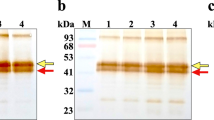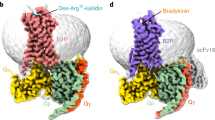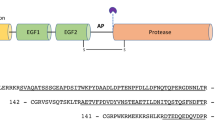Abstract
Pig pancreatic kallikrein liberates kallidin from kininogen1, whereas trypsin releases bradykinin2. Recently, both kallikrein and trypsin have been reported to convert inactive plasma renin to active renin3,4. However, we found that at pH 6.0, trypsin generated an angiotensin II-like pressor substance from human plasma protein in the absence of converting enzyme5. This has been isolated and found to have the same amino acid composition as angiotensin II6. Thus, in vitro trypsin can directly liberate both the depressor, bradykinin, in weak alkaline conditions, and the pressor, angiotensin II, at weakly acidic pH, from the appropriate substrates. We have now investigated whether kallikrein—a serine protease like trypsin—also generates a pressor substance at weakly acidic pH. Our results demonstrate that it does. We therefore suggest that kallikrein may be involved in a direct link between the pressor and depressor systems and we propose the term ‘kinin–tensin system’ for this sort of one-enzyme system capable of generating both depressor and pressor substances.
This is a preview of subscription content, access via your institution
Access options
Subscribe to this journal
Receive 51 print issues and online access
$199.00 per year
only $3.90 per issue
Buy this article
- Purchase on Springer Link
- Instant access to full article PDF
Prices may be subject to local taxes which are calculated during checkout
Similar content being viewed by others
References
Habermann, E. & Blennemann, G. Naunyn-Schmiedebergs Arch. exp. Path. Pharmak. 249, 357–373 (1964).
Elliot, D. F., Horton, E. W. & Lewis, G. P. Biochem. J. 78, 60–65 (1961).
Sealey, J. E., Atlas, S. A., Laragh, J. H., Oza, N. B. & Ryan, J. W. Nature 275, 144–145 (1978).
Yokosawa, N., Takahashi, N., Inagami, T. & Page, D. L. Biochim. biophys. Acta 569, 211–219 (1976).
Arakawa, K., Ikeda, M., Fukuyama, J. & Sakai, T. J. clin. Endocr. Metab. 42, 599–602 (1976).
Arakawa, K., Yuki, M. & Ikeda, M. Biochem. J. 187, 647–653 (1980).
Arakawa, K., Minohara, A., Yamada, J., Uemura, N. & Nakamura, M. Clinica chim. Acta 22, 309–315 (1968).
Habermann, E. Handb. exp. Pharmak. 25, 250–288 (1970).
Arakawa, K., Minohara, A., Uemura, N., Sakai, T. & Ikeda, M. Endocr. jap. 22, 472–432 (1975).
Barret, A. J. Biochem. J. 104, 601–608 (1967).
Cushmann, D. W. & Cheung, H. S. Biochem. Pharmac. 20, 1637–1648 (1971).
Hummel, B. C. W. Can J. Biochem. Physiol. 37, 1393–1399 (1959).
Aoyagi, T. et al. J. Antibiotics 25, 689–694 (1972).
Arakawa, K., Nakatani, M., Minohara, A. & Nakamura, M. M. Biochem. J. 104, 900–906 (1967).
Author information
Authors and Affiliations
Rights and permissions
About this article
Cite this article
Arakawa, K., Maruta, H. Ability of kallikrein to generate angiotensin II-like pressor substance and a proposed ‘kinin–tensin enzyme system’. Nature 288, 705–706 (1980). https://doi.org/10.1038/288705a0
Received:
Accepted:
Issue Date:
DOI: https://doi.org/10.1038/288705a0
This article is cited by
-
Angiotensin-(1-12): A Chymase-Mediated Cellular Angiotensin II Substrate
Current Hypertension Reports (2014)
-
Molecular aspects of kallikrein and kininogen in the maturing kidney
Pediatric Nephrology (1993)
Comments
By submitting a comment you agree to abide by our Terms and Community Guidelines. If you find something abusive or that does not comply with our terms or guidelines please flag it as inappropriate.



